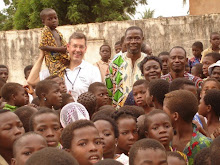How Much Is Too Much?
A Guide to Giving Your All, Literally
In Shel Silverstein’s The Giving Tree, children are presented with a kindly tree who gives of its fruit, give of its branches, and eventually even gives of its trunk until there is nothing left except a stump. The children then have a place to sit, and the tree is happy and continues to give.
Reading this tale, I first thought it was a travesty. How stupid that a tree would be reduced to a stump and still feel worthy?
Still in my own life, building an international organization to help orphans around the world, I have had to make similar judgments at every step of the way.
Use frequent flier miles to take my mom on vacation, or to visit children living in a garbage dump in Bali? Leave Wall Street? Cash out my 401-K? Max out my credit cards? Pay my rent pay teachers for children in Haiti? There is no guide. So I will try to write one.
“Mathew’s Rule” is the foundation of Orphans International Worldwide, the organization that I founded in 1999. It states simply that each child in our care be treated the way we would treat our own children.
I now offer “Jim’s Rule”- how to know how much to give back to society.
As humans we have basic and secondary needs that are vital to our life and happiness. Primarily, we must eat, sleep, have housing and clothing, and maintain our health. Secondarily, we need to share love – with parents, children, and life partners.
Desires such as better food, nicer housing, more expensive clothes, going to the gym are on a third plane.
“Jim’s Rule” states that as long as our primary and secondary needs are met, sacrifices may be made on the third level to better our world.
As a result of my choices, unexpectedly I meet regularly with heads of state and royalty, sip champagne and eat caviar. I also celebrate family birthdays at White Castle, own few clothes, and allow my friends to treat me to Broadway plays and buy me books for my birthday. The socks-and-underwear under the tree at Christmas that annoyed me in my youth now delight me.
It has been difficult for me to be comfortable being treated to dinner and theater – I’m used to treating. The feeling might be similar to being able to accept care one day from my own child.
Christians discuss being good stewards of one’s resources to better the world and to live with sacrifices, like Lent. Jews debate the best way to repair the world. Muslims sacrifice and fast for the month of Ramadan to experience an austere life, so they can better understand and respond to those who have less. Buddhists and Hindus give to the less fortunate, mindful of karma.
Priests and nuns, like Buddhist monks or members of a kibbutz, give their all to the greater good, trusting in the institution of the church, temple, or collective to care for them. “Jim’s Rule” applies when one without or with little institutional support thinks about how far they can go without a safety net.
Globally, there is a safety net for do-gooders in family, neighbors, and one’s house of faith. But these often have limits that can be exhausted early.
Time is another precious asset. How much time to work? To relax? To love? To sleep? Our bodies’ needs vary greatly. I can go on five hours sleep per night for a month but then crash for a whole day. To remain focused, I try to limit myself with Orphans International to twelve hours a day, six days a week. To flourish in a relationship and be a good father, is how I use the other 12 hours.
To be an asset to society, one must maintain one’s base. Without a base, you are a liability to everyone. You can only help others if you are not in need of help yourself. Like adults who must receive oxygen in an airplane emergency first, our children benefit when we are stable.
So how much is too much when it comes to giving your all? Learning from our children’s book, The Giving Tree, I propose Jim’s Rule: Give of your fruit, your extra money and time. Perhaps give your branches, even more of your resources. But your trunk is your essence. A stump helps humanity only in fairy tales. – Jim Luce, New York

1 comment:
Really nice thoughts, thanks for sharing!
Post a Comment